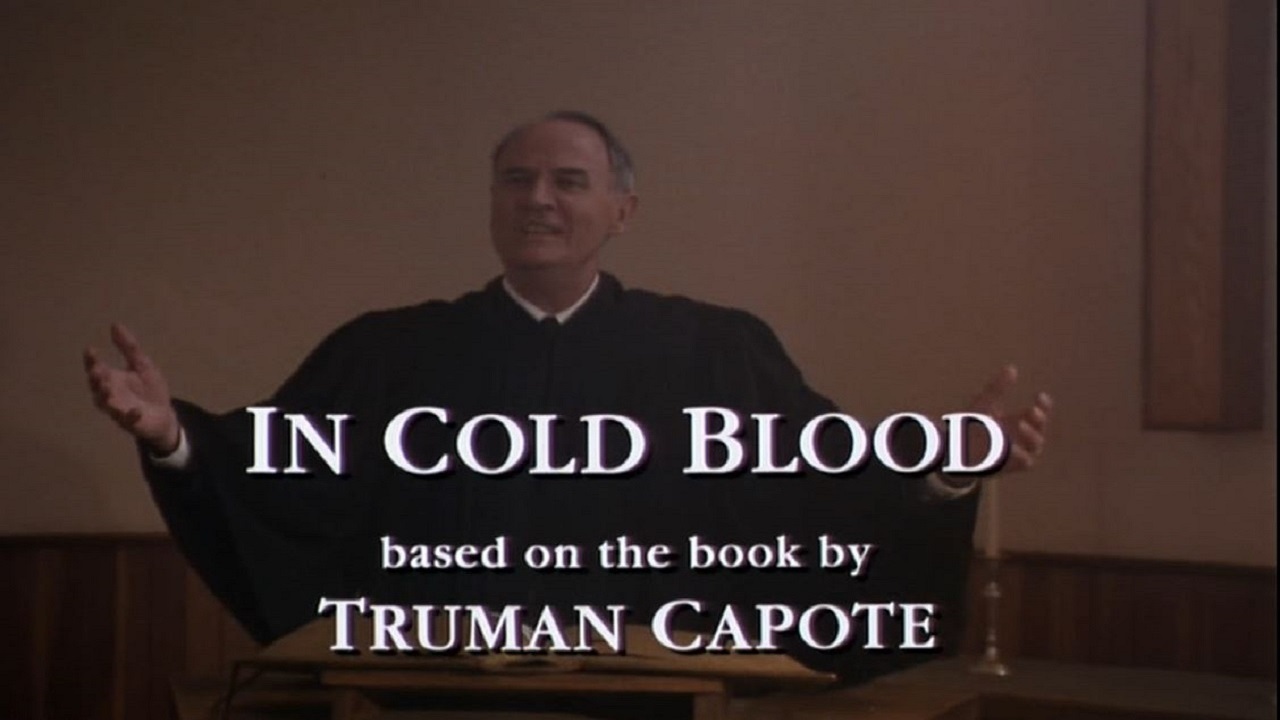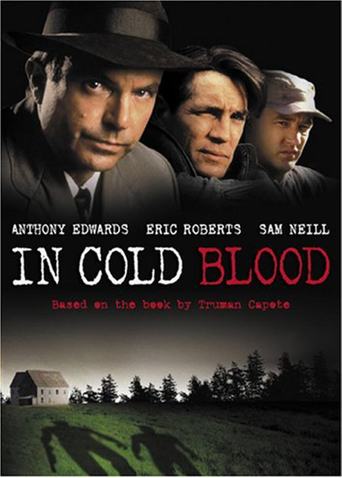

Truly Dreadful Film
... View MoreThe greatest movie ever!
... View MoreExcellent, Without a doubt!!
... View MoreIf you're interested in the topic at hand, you should just watch it and judge yourself because the reviews have gone very biased by people that didn't even watch it and just hate (or love) the creator. I liked it, it was well written, narrated, and directed and it was about a topic that interests me.
... View MoreFirst off, the atmosphere is just not there. The 1967 film had black and white photography and a truly inspired score that really put you in the mood, and in the time and place. As usual in films that try to take you back to more innocent times - in this case rural 1959 Kansas - they get the art direction and costumes down and just get the personalities of the people all wrong. In reality, Dick Hickock and Perry Smith were just inches from turning on each other like wolves many times after the crime. Here they tussle a little, but the real dark differences between them are just not shown. Hickock was in actuality the stronger and the more sociopathic of the two, here he is shown as just a carefree womanizer with a criminal bent for theft. Likewise, the actual deep remorse that Perry Smith felt over the murders is not shown, nor is the fact that he was the weaker of the pair, and a dreamer. In fact, Perry is shown as the stronger of the two.Not only are the criminals shown as not that menacing, the townspeople are shown as more modern in their speech patterns than was actually true. In a town where it really was true that EVERYBODY went to church every Sunday, where it really was true that a romance between a Catholic and a Methodist was doomed to failure, the female owner of the local diner is not going to yell across the room to a man who is a stranger to her "You bet your butt I do!" in response to how good a cup of coffee she makes.Of course at the end, the details of the crime are shown - at least from Perry Smith's viewpoint - because today people are used to seeing that kind of thing in the news and on broadcast TV - a family killed by complete strangers. In the 1967 film the details of the grisly murders would have been out of the question since the production code was technically in force for another couple of years.If you get a chance to see the 1967 version, it's a toss-up as to whether or not this one is worth your time. It is not bad, it is just not up to the standards of the original theatrical film.
... View MoreLike others, I have seen and studied most of the books and films concerning the Clutter Killings, including a few dramatic works thematically based on the actions and psycho-mythology of the participants to the crime -- including Capote himself. As to Capote, I cannot forgive him for willfully withholding Perry Smith's confessions, intimacies and writings from even the defense counsels. I believe truths and facts Capote "reserved" for his "book," which required for Capote two guilty verdicts and capital punishment, would almost certainly have sustained a successful insanity defense for Perry Smith even under the old McNaughton Rule. Capote himself could never write another major literary work after "In Cold Blood." Shame and guilt. In my opinion, he willingly encouraged and planned the brutal capital punishment to provide the spectacular ending he required for his book/drama. To him, both men HAD to die for his book to succeed. The book had to justify itself by pretending it was about the horror of capital punishment. His actions and silence assured that ice-cold conclusion.Capote's book is not truth. It is not factual or journalistic. It is drama and melodrama spiced with his own creatively psychotic imagination. What most people consider the virtues of the contemporaneous first movie are stark images of Capote's mind, which may have been the most cold-blooded aspect of all. No wonder viewers ironically but necessarily prefer Blake's performance. That actor IS the nightmare from Capote's dishonest imaginings.So who is to say how the two killers should be played? Who is to judge what could make an essentially poetic psychotic snap from excessive courtesy and kindness to "do it now" killing? I agree with the few who see in Eric Roberts' work a magnificent performance, Shakespearean in its range, yet played with heartbreaking sincerity. Anthony Edwards takes a much safer "attitude mode" to create a smarmy Hickok; but he is one-dimensional and boring, with only a few notes in his television range. Roberts is almost four-dimensional, adding physical weakness and agony to a powerful animal body, a Frankenstein Creature who thinks in poetry and knows exactly what NOT to do. Like Leopold apropos Loeb, Robert's Perry Smith is hopelessly in love with an evil man. Without Hickok or a man of his particularities, Perry Smith would not have brought his psychotic mind into a world of horrors. He fears himself more than he fears anything else in life.Given the freedom from Capote's death grip on the consciousness of the Clutter killings, Roberts and Edwards are free to create original personalities and psychoses to craft a different and new production of the drama. Same facts, some of the same lines from the case record, but deeper, more complex, with clearly titanic psychotic stresses -- indeed Roberts is so good at this fluidic madness that he physically and facially demonstrates in every moment how little awareness he has of where or who he is.What many of our reviewers dislike about this film, Roberts in particular, is that cold-blooded killing isn't shown the way they expect and have been manipulated to demand. That is because here we are seeing a far more profoundly realistic "interpretation of life and death" than Capote could ever create -- a real Tragedy.The actual cold-blooded killer, Mr. Capote, and his hypocritically artistic "non-fiction novel" do not control these interpretations and performances.If "In Cold Blood" and Capote's effect on life, literature and truth matters as much as scholars say, then it takes guts as well as talent to portray the truth, or a version of the truth, that is not the rank, cowardly lie drawn up from the fathoms of Capote's own abyss.
... View MoreThis two-part TV mini-series isn't as good as the original from 1966 but it's solid. The original benefited from a huge number of things---it was all in black and white, it had a great jazz score and it was filmed at the real locations, including the home of the doomed Clutter family. That was important because in the book and in the original movie the home is very much a character itself.This remake was filmed in Canada which I guess doubles okay for Kansas. The story tries to be as sympathetic to Perry as it dares to and Eric Roberts plays him as a somewhat fey person, his homosexuality barely hidden. The gentler take by Roberts doesn't quite work in the end though because it's hard to believe that his version of Perry Smith would just finally explode in a spasm of murder. Whereas Robert Blake's take on Smith left you no doubt that his Perry Smith was an extremely dangerous character.Anthony Edwards was excellent as the bombastic, big-mouthed and ultimately cowardly Dick Hickcock, the brains of the outfit. His performance compares very well to Scott Wilson's role in the original movie.Since this is a longer movie it allows more time to develop the Clutter family and in this regard I think the 1996 movie has an advantage. The Clutters are just an outstanding, decent family. They've never harmed another soul and it is just inexplicable that such a decent family is ultimately massacred in such a horrifying way. It still boggles my mind that, after the Clutters were locked in the bathroom, that Herb Clutter didn't force out the window so at least his children would have a chance to escape. This movie has the thought occur to him, but too late. From what I read about the real home, which is still standing, the way the bathroom is configured they could've opened the counter drawers and effectively barricaded the door which would've forced the killers to blast their way in. But it might've bought time for some of the Clutters to escape. Why the Clutters didn't try this, I have no idea.Fans of the book will recognize that this movie takes a lot of liberties with how the crime is committed but not too serious. Still, it's distracting to viewers like me who have read tons about the case. The actors playing the cops, led by Sam Neill and Leo Rossi, are uniformly excellent, much better, I think, as a group, than the actors in the original movie. They know that to secure the noose around the necks of both of them they have to get them to confess. And the officers come to the interview impeccably prepared. They had already discovered the likely alibi the phony story of going to Fort Scott, and had debunked every jot of it. The officers then let Smith & Hickcock just walk into their trap. Hickcock is a b.s. artist who figures he can convince anyone of anything and the officers respectfully let him tell his cover story. But when they lower the boom on him, he shatters very quickly. It's very well filmed and acted and very gratifying to watch because the viewer naturally should loath Hickcock in particular by this point, a cowardly con-man who needs the easily manipulated Smith to do his killing for him. Supposedly Hickcock later stated that the real reason for the crime wasn't to steal money from the Clutters but to rape Nancy Clutter. At least she was spared that degradation.The actors playing the Clutters are very good, Kevin Tighe as Herb Clutter in particular. The story sensitively deals with Mrs. Clutter's emotional problems, most likely clinical depression, and Mrs. Clutter displays remarkable inner strength when she firmly and strongly demands that the killers leave her daughter alone. From what I've read the Clutters' surviving family was particularly bothered by how Bonnie Clutter was portrayed in the book, claiming it was entirely untrue. But as an aside, both of the killers related to the police how Mr. Clutter asked them to not bother his wife because of her long illness. Capote might make up that fiction to make the character of Bonnie more interesting but certainly the killers had no reason to falsely portray Mrs. Clutter and no doubt much of the conversation in the book (duplicated in the movies) is right off the taped confessions of the killers. So it would've been nonsensical for Herb to have said that and not have it be true.
... View MoreWhy do they insist on making re-makes of great movies like "High Noon" "From Here to Eternity" and this one?Why do they think that color is more engrossing to a viewer than stark black and white?Why did Robert's insist on wearing that dopey, broad-billed, baseball cap?...it made him look like Jim Varney.Why would anyone spend four hours suffering through this?Watch the original. Then YOU won't have to ask yourself WHY.
... View More